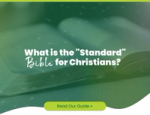UK or US Evangelism - Does it Really Matter?
Les Ellison
What, if anything, can America teach the UK about Christianity and what it means to be a Christian in Britain today. Can the big name US churches, evangelists and Christain publishers teach the UK how to do church in the twenty-first century?
With its massive churches and publishing houses, much of the literature and evangelical effort focused on the UK church originates from American sources.
For many UK Christians, 'focused' probably isn’t the word they'd choose. Rather, it seems that the industrial grade Christianity produced for mass consumption in the US washes like a tidal wave through UK churches. Culturally threatening and at the same time strangely irrelevant, what are UK evangelists to make of this transatlantic inundation? Are American teaching and preaching resources useful, useless, or dangerous, and what should UK churches do in response?
UK or US: different as chalk and calcite?
Essentially the same and yet clearly distinct, US and British culture is as different and similar as cricket and baseball, rugby and American football, Smarties and M&Ms, Desperate Housewives and Calendar Girls.
Where the British keep their emotions private and under wraps, Americans wear their hearts on the sleeves. In Britain faith is a private matter but in the US your beliefs are public property.
Doing church in Britain and America
About 86% of Americans identify themselves as Christian with 40% as regular church goers. In the UK that figure's only 71% with just 10% making the weekly trip to a place of worship. But the numbers aren’t the only difference. There's a difference in the Christian character of North American and British that's rooted way back the religious histories and traditions of the two continents.
For one thing, the US is one big refugee camp for Christians from all over Europe whose ideas didn’t or wouldn’t conform to what was happening in the Old Country. Sometimes they fled to America because things weren’t changing fast enough and sometimes because they’d changed at all. Either way, the underlying characteristic of North American Christianity is one of escape from reality.
Fair enough, this image isn't a true reflection of each individual, modern day North American Christian. Many have moved into or grown up in a Christian culture established before they were born or arrived in the US. Even so, outcome of this background is a Christian culture that exepcts to impose itself in a way that the UK and most European churches regard as almost medieval... though some may long for those days to return.
Christian tolerance, change and compliance
Christian culture in the US has, from its beginning, been out of sync with what’s happening in Europe. European and in particular UK Christianity is very much adaptive and evolving. Despite horrific persecution of all denominations and traditions over the centuries, English Christianity eventually always conforms to the times, adopts its freedoms and learns to live with its restrictions. Critics may brand English Christianity – in all but its most violently extreme constructions, as cowardly and compliant. This is grossly unfair as, by continual change and adaptation, European Christianity has become more integrated creating into a less religious and more diverse society bringing with it an undercurrent of tolerance.
The great strength of English Christians is their acceptance that most people aren’t even Christian. Churchgoers, like everyone else, are more likely to vote for a politician or employ a professional based on his or her competence – or at least professed competence, rather than any declared faith. Surely this is a good thing and avoids deepening any political divide with an added religious dimension. Even the briefest look at the trouble spots around the world where religion deepens a rift rather than works to build a bridge across it will show the immediate benefits of privately expressed faith as the potential starting point for publicly received healing.
Power of faith in public and economic life
On the other side of the Atlantic expressions of faith are expected even obligatory in political office. Despite an insistence that religion is excluded from public life, declarations that the its people is 'One nation under God' and that 'In God We Trust' are carved into the stonework of national life and most of its national monuments. There’s no denying that in America Christianity has a much higher profile and has a direct influence on politics. How much of that influence is motivated by love of Christ and the power of the spirit, and how much by fear of man and the power of the ballot, is open for argument.
The power of the voting and, qually potent, the spending Christian carries over into the entertainment industry in different ways on each side of the Altantic too. American and British book and film bestseller lists show how the 'Christian' dollar or pound reflects a differing demand for faith based media. Where religious material is in high demand, it can afford to be bold and brash - in fact it has to be to compete with other faith based offerings. Where it has less of a profile, it has to be more subtle to get in without simply reinforcing negative perceptions.
For the third week of April 2012, The New York Times bestselling non-fiction paperback was Todd Burpo’s Heaven is for Real. This is story of a boy who died, went to heaven and returned to write about it. Other US book charts, including Squarespace and Nielsen, also listed Todd’s book in their top 5. In the same week, UK sales figures from WH Smiths and Askews Library service listed Jennifer Worth’s account of life and childbirth in 1950s London, Call the Midwife, as number 1 in the same category. Heaven is for Real wasn’t even placed.
When the faith based movie Courageous launched in US cinemas it took $9million in its first week and went straight into the US movie charts at number 6. In the UK the movie wasn’t released until January 2012 and then only on DVD. British distributors know that overtly Christian films – however well produced, do not have the necessary mass market, commercial appeal for main stream theatre screenings. To prove the point, many of you will remember your church urging you to join the campaign to get the 2005 version of CS Lewis of the Lion The Witch and The Wardrobe into reluctant high street cinemas.
Common problems and the one solution
For all the celebrated differences between British and American society, culture and public life, there is much common ground mainly in the problems faced in all of those areas, by two of oldest, richest and fastest declining nations in the new world order. Both countries have huge and largely glossed over financial problems, both face potentially disastrous climate change and both are confused over their international role and purpose. Moral dilemmas at the heart of society, the collapse of old certainties and the grossly unequal distribution of benefits from new technology add to the sense that all attempted remedies are doomed to failure.
But Christians on both sides of the Atlantic agree on one thing at least – the actual solution to all of the problems. UK and US Christians know what a Christ centred society should look like. They might disagree on things like the bearing of arms, but they know that in that in a Christ centred world your own gun would be unnecessary. Mostly the two church traditions agree on how to get there too. Both have an instinct for free choice, for winning an argument rather than a fight and for proving your beliefs by living them out rather than their imposition. Christianity on both shores has a tradition of service, social activism and justice tempered with forgiveness and mercy.
Adapting the solution to different cultures
The real difference is in the way churches expect their message to be received. British churches have no wish to alienate non-Christians with brash, hard-sell American evangelism, and Americans know the more low key UK style of activism would be swamped in their intense mass market culture. In a way, the British churches are guilty of abandoning responsibility by expecting their American brothers and sisters in faith to give them a tailor made solution to the UK Church's problems. In truth, there is no one-size-fits all solution. There never was – not on any side of the Atlantic, not any side of the city, not on any side of the street.
The big American churches and publishers with their industrial grade Christianity merely reflect their own culture. UK culture has never done industrial strength anything as well as the US. But bespoke, carefully crafted solutions – that we do well. Just like so many finely crafted British products are created from the blending and refinement of mass produced items, the way the Christian message will be received in the UK will need a craftsman’s reworking of the vast resources from US produced teaching and preaching raw material.
In the long run, the answer might be for more UK based evangelists, churches and publishers to raise their game and their level of commitment by producing tailor made UK resources to the same quality, marketability and price as their US equivalents. Until then UK evangelists need to apply the talents of adaptability, evolution and even compliance that they’ve learned the hard way over the centuries. There’s no point in reinventing the wheel of church resources - there are plenty of big wheels. But there’s every purpose learning how to steer them in the right direction.
Latest Blogs

Gifts
Finding Your Symbol of Faith: A Guide to Christian Cross Necklaces
Looking for the perfect symbol of faith? Explore our guide to Christian cross necklaces, from rustic wooden designs and sturdy men's chains to elegant silver pendants.

Gifts
The Best Christian Gifts for Under £20
Looking for a meaningful gift that won't break the bank? Explore our guide to the best Christian gifts under £20, from inspiring journals to beautiful home decor.

Gift Guide
15 Confirmation Gift Ideas for Boys and Girls
Celebrating a confirmation? Discover 15 meaningful gift ideas for boys and girls, from youth Bibles and jewellery to inspiring journals and keepsakes.

Bible
30+ Powerful Quotes About the Bible (For Inspiration in 2026)
Looking for inspiration? Discover a curated collection of the most powerful quotes about the Bible, from famous historical figures to modern theologians and Scripture itself.

Bibles
What is the "Standard" Bible for Christians?
Is there an "official" Bible that all Christians use? We explain the difference between the NIV, KJV, and ESV, and help you find the standard text for your church or personal reading.

Bible
"I Keep Failing to Read the Bible" – 5 Tips to Make the Habit Stick
Do you start a Bible reading plan only to quit a few weeks later? Stop the cycle of guilt. Here are 5 psychological tips and practical changes to help you build a Bible habit that actually lasts in 2026.
